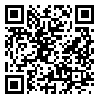Volume 20, Issue 77 (7-2020)
refahj 2020, 20(77): 141-180 |
Back to browse issues page
Download citation:
BibTeX | RIS | EndNote | Medlars | ProCite | Reference Manager | RefWorks
Send citation to:



BibTeX | RIS | EndNote | Medlars | ProCite | Reference Manager | RefWorks
Send citation to:
hedayat O, basity S. (2020). Border Settlement, Border Economy, and Family Problems: The Case Study of Border Cities of Baneh and Marivan. refahj. 20(77), 141-180.
URL: http://refahj.uswr.ac.ir/article-1-3757-en.html
URL: http://refahj.uswr.ac.ir/article-1-3757-en.html
Abstract: (5091 Views)
Introduction: the aim of the present study is family pathology in these areas where borders and border economics are the basis for shaping injuries.
Method: The background conditions for the formation of injuries, causal and interventional conditions, consequences, and strategies for analyzing the interviews conducted were sought using the grounded theory methodology.
Findings: The interviews with 30 people reached theoretical saturation and in the form of 19 primary categories and there were also five secondary categories: the transformation of socio-cultural values, the dominance of the border economy, Culbery and family injuries, disregard for educational and counseling issues, and ignoring new issues and family injuries.
Discussion: Economic gaps and inequalities, lack of investment and youth unemployment and people’s dependence on unsustainable border livelihoods and increase in the cost of living and the spread of corruption at the border are the most important consequences that the border economy has created in these areas. The situation with Culbery has been referred to as a factor harming the economy and at the same time causing other harms such as increasing sexual and physical harm, increasing domestic violence, consuming energy for Culbery and lowering Culbery. This situation has also exacerbated the harms of aging, early divorces and the prevalence of family sexual problems, cyberspace harms, and emotional divorce of couples, which are ignored due to the lack of education.
Method: The background conditions for the formation of injuries, causal and interventional conditions, consequences, and strategies for analyzing the interviews conducted were sought using the grounded theory methodology.
Findings: The interviews with 30 people reached theoretical saturation and in the form of 19 primary categories and there were also five secondary categories: the transformation of socio-cultural values, the dominance of the border economy, Culbery and family injuries, disregard for educational and counseling issues, and ignoring new issues and family injuries.
Discussion: Economic gaps and inequalities, lack of investment and youth unemployment and people’s dependence on unsustainable border livelihoods and increase in the cost of living and the spread of corruption at the border are the most important consequences that the border economy has created in these areas. The situation with Culbery has been referred to as a factor harming the economy and at the same time causing other harms such as increasing sexual and physical harm, increasing domestic violence, consuming energy for Culbery and lowering Culbery. This situation has also exacerbated the harms of aging, early divorces and the prevalence of family sexual problems, cyberspace harms, and emotional divorce of couples, which are ignored due to the lack of education.
Type of Study: orginal |
Received: 2020/04/5 | Accepted: 2020/07/2 | Published: 2021/03/6
Received: 2020/04/5 | Accepted: 2020/07/2 | Published: 2021/03/6
Send email to the article author
| Rights and permissions | |
 |
This work is licensed under a Creative Commons Attribution-NonCommercial 4.0 International License. |







